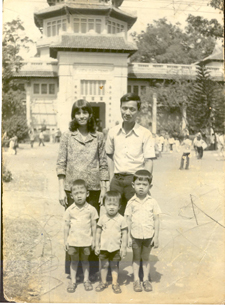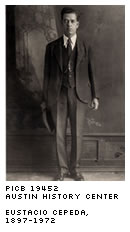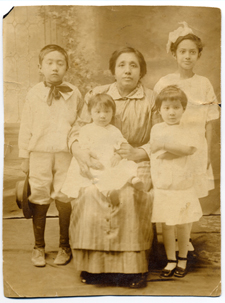![[Youth of the Brown Berets], undated, PICA 37614](/library/styles/wide/public/ahc/pica_37614b_main_image_edit.jpg?h=dc1b3c4f&itok=BECqWut6)
[Youth of the Brown Berets], undated, PICA 37614
Outreach
The Austin History Center values the relationships that we build with the community that we serve. As a community-based archive, all aspects of our operation are strengthened by our ties to the people and groups that make up Austin, Texas. We seek out archival materials from historically under-documented communities in Austin and Travis County through outreach efforts and programming as part of our unique Community Archives Program.
AHC staff are also available for presentations on various topics, and tours of our historic building and exhibits are often available upon request.
Community Archives Program
Community Archives Program
The Community Archives Program at the Austin History Center is dedicated to collecting and preserving the history of underrepresented and marginalized groups in Austin and Travis County. This program strives to provide historical recognition and representation for the lives and experiences of Austin's diverse communities by intentionally documenting the histories of African American, Mexican American & Latine, and Asian Pacific American communities in Austin and Travis County.
Through community engagement and outreach initiatives, the Community Archives Program acquires historical materials (such as personal and family documents and photographs, periodicals, oral histories, business records, etc.) to add to the Austin History Center’s historical collection. The program also develops programming and events to educate the general public about a more inclusive and diverse history of Austin and Travis County.
For more information about the Community Archives Program, please contact us at: communityarchives@austintexas.gov
Check out this video to learn more about the Community Archives Program.
Copy link to section
African American Community Archivist
African American Community Archivist
Thank you for your interest in the work of the African American Community Archivist. This part of the site is temporarily unavailable as we update our content. We look forward to sharing an updated version of the African American Subject Guide, and information about the Community Archives Program and how we partner with communities to document and preserve important histories from Travis County and the surrounding areas.
Copy link to sectionAsian American Community Archivist
Asian American Community Archivist
TheAustin History Center’s Asian American Community Archivist Program actively collects archival materials from Asian communities in Austin and Travis County through outreach efforts and programming. We give presentations, conduct research and oral history interviews, coordinate programs and events, provide reference service to the public, and are a subject specialist in the history of Austin’s Asian American community.
Asian American History in Austin
Asian Americans make up over 7% of Austin's overall population, and their communities are only growing throughout the city. The history of Austin's Asian American community is tied to both state and national narratives of Asian American migration, settlement, and community formation. Austin's Asian American heritage connects to many aspects of a broader history including early Chinese American railroad labor, Japanese American farming, U.S.military relations with the Phillipines and China, Japanese American internment, the Vietnam War and refugee communities, post-1965 immigration, and the 1980s technology boom. Though most of Austin's Asian American population came here within the past 30 years, much of this history along with earlier histories remain undocumented. In order to recover the history of Asian Americans in Austin, we rely on the Asian American community of Austin to share their histories with us so we can collect, preserve, and share their histories for all future generations.
Resources
Our Asian American Resource Guide provides a general overview of all archival materials at the Austin History Center that pertain to the Asian American community. The materials in the resource guide are arranged by collection unit of the Austin History Center. Within each collection unit, items are arranged in shelf-list order. To access these items, please visit the Reading Room at the Austin History Center.
To learn more about the early history of Chinese Americans in Austin, you can also watch KLRU's Austin Revealed, Pioneers From the East series that highlights the Austin History Center's Asian American community archive program with three episodes narrating the stories of three of the first families of Chinese origin to settle in the Austin area.
Past Projects & Exhibits
Selections from the following Asian American Community Archivist exhibits are available online:
Vietnam To Austin: Restoring Community

Focusing on the history, transition, and contributions of local Vietnamese Americans in Austin, the exhibit "Vietnam to Austin: Restoring Community" included powerful personal stories shared by many individuals through oral histories, photographs, and personal records. In partnership with the Vietnamese American Heritage Foundation, the exhibit was on display at the Austin History Center from February 21 to July 17, 2009. Image: Nguyen Family Papers (AR. 2009.056)
Pioneers from the East: First Chinese Families in Austin
The photo exhibit "Pioneers from the East: First Chinese Families in Austin" featured the history of five of Austin's earliest Chinese American families. The exhibit was displayed at the Austin History Center from April 27 to October 17, 2010. Image: Sing Family Papers (AR.2008.002)
Copy link to sectionMexican American & Latine Community Archivist
Mexican American & Latine Community Archivist
The Austin History Center’s Mexican American & Latine Community Archivist, serves as an educational resource for the community in various capacities.
Sources of Information About Latines and Mexican Americans in Austin
 The Latino/a/e/x Resource Guide contains valuable materials about Austin's Latine communities, although there is much that remains to be documented. The materials in the resource guide are arranged by collection unit of the Austin History Center. Within each collection unit, items are arranged in shelf-list order. To access these items, please visit the Reading Room at the Austin History Center.
The Latino/a/e/x Resource Guide contains valuable materials about Austin's Latine communities, although there is much that remains to be documented. The materials in the resource guide are arranged by collection unit of the Austin History Center. Within each collection unit, items are arranged in shelf-list order. To access these items, please visit the Reading Room at the Austin History Center.
Significant gaps in the Latine Communities collection remain and continued work to fill the gaps is needed. In order to assist in building the collections, the final section of the bibliography lists "Under-documented Areas of Interest." This detailed listing of topics and people about which additional material is still needed at the History Center is intended to alert the public to these specific needs in the collection as well as inspire donations of materials.
Projects & Exhibits
Austin Chicano Huelga Oral History Project
We are working with Preservation Austin to bridge the gap in historical documentation of Austin's Chicano Huelga and the broad Chicano movement in Austin during the 1970s. If you or someone you know are interested in having an oral history interview to be deposited in our archives, please contact Marina at: (512) 974-7498, or marina.islas@austintexas.gov
Tribute to La Musica Chicana Oral History Project (AR.2021.037)
Austin, Texas is considered the “Live Music Capital of the World.” The purpose of Tribute to la Musica Chicana: Community Oral History Project is to fill a gap in Austin’s music history regarding the impact of Chicana music during the 1960s and 1970s. Thanks to the Bronze Community Band Project and a Humanities Texas Major Grant for Community Projects our community researchers collected 25 oral history interviews between 2020-2022. Our community researchers were able to complete the majority of these interviews virtually. The interviews have been transcribed and are currently undergoing review to ensure the transcripts match the interviews and will be available to researchers when that process is complete. We hope to continue our work with additional oral history interviews and a celebratory event in the future.
Emma S. Barrientos Mexican American Cultural Center (ESB-MACC) Oral History Project
A goal of this oral history project was to document and honor many of the individuals who played a significant role in the decades-long struggle leading to the creation of the Emma S. Barrientos Mexican American Cultural Center (ESB-MACC), while also exploring the growth and obstacles experienced throughout the process. Included in this collection are the preserved oral histories of 28 stakeholders, including transcripts, audio and some video. The archival collection (AR.2015.012) also includes newspaper clippings and articles from 1970-2012 depicting the socio-political and cultural landscape of the times. Read more and hear the oral histories.
Copy link to section